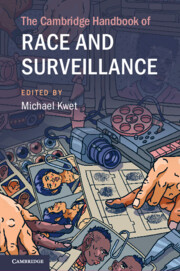Book contents
- The Cambridge Handbook of Race and Surveillance
- The Cambridge Handbook of Race and Surveillance
- Copyright page
- Contents
- Figures
- Contributors
- Acknowledgments
- 1 The Golden Age of Racial Surveillance
- 2 Sorting Identity
- 3 Imperial Mimesis
- 4 The Racialisation of British Women during the Long Nineteenth Century
- 5 Linking Caste and Surveillance
- 6 Surveillance in South Africa
- 7 Israel/Palestine, North America, and Surveillance
- 8 Colonialism’s Uneasy Legacy
- 9 China’s Surveillance and Repression in Xinjiang
- 10 Asian Americans as “the Perpetual Foreigner” under Scrutiny
- 11 The Great White Father and His Little Red Children
- 12 In a Most Excellent and Perfect Order
- 13 Surveillance and Public Schools
- 14 Surveillance and Preventing Violent Extremism
- 15 Resistance and the Politics of Surveillance and Control
- 16 Surveilled Subjects and Technologically Mediated Law Enforcement
7 - Israel/Palestine, North America, and Surveillance
Published online by Cambridge University Press: 23 February 2023
- The Cambridge Handbook of Race and Surveillance
- The Cambridge Handbook of Race and Surveillance
- Copyright page
- Contents
- Figures
- Contributors
- Acknowledgments
- 1 The Golden Age of Racial Surveillance
- 2 Sorting Identity
- 3 Imperial Mimesis
- 4 The Racialisation of British Women during the Long Nineteenth Century
- 5 Linking Caste and Surveillance
- 6 Surveillance in South Africa
- 7 Israel/Palestine, North America, and Surveillance
- 8 Colonialism’s Uneasy Legacy
- 9 China’s Surveillance and Repression in Xinjiang
- 10 Asian Americans as “the Perpetual Foreigner” under Scrutiny
- 11 The Great White Father and His Little Red Children
- 12 In a Most Excellent and Perfect Order
- 13 Surveillance and Public Schools
- 14 Surveillance and Preventing Violent Extremism
- 15 Resistance and the Politics of Surveillance and Control
- 16 Surveilled Subjects and Technologically Mediated Law Enforcement
Summary
In March 2017, the Israeli Knesset (Parliament) passed a law allowing for the denial of entry or residence to foreign nationals who support Boycott, Divestment and Sanctions (BDS) against the state of Israel or its settlements.1 Proponents of BDS are part of a now global nonviolent movement of civil society (non-state) actors challenging the government of Israel’s policies towards Palestinians. Reflecting that the movement also has supporters within Israel, less than three weeks later it was revealed that Israel’s then Minister of Strategic Affairs, Gilad Erdan, also sought to expand his ministry’s collection of information on activists who support BDS to include Israeli citizens as well as foreigners.2 Governmental development of such a database on citizens was questionable both on grounds of extant Israeli law and the protection of privacy rights. However, this practice stands as a telling example of how the BDS movement has moved to the front line of Israel’s contemporary surveillance efforts.
- Type
- Chapter
- Information
- The Cambridge Handbook of Race and Surveillance , pp. 123 - 136Publisher: Cambridge University PressPrint publication year: 2023

